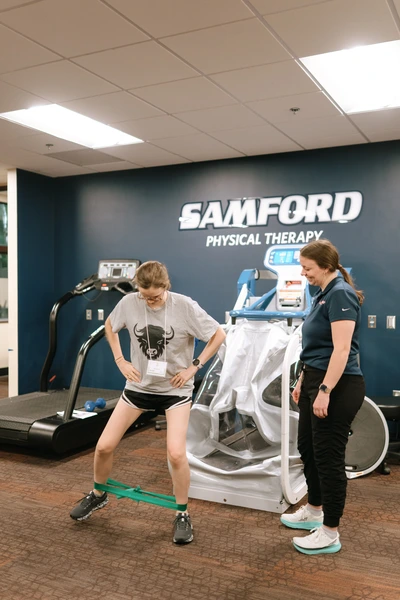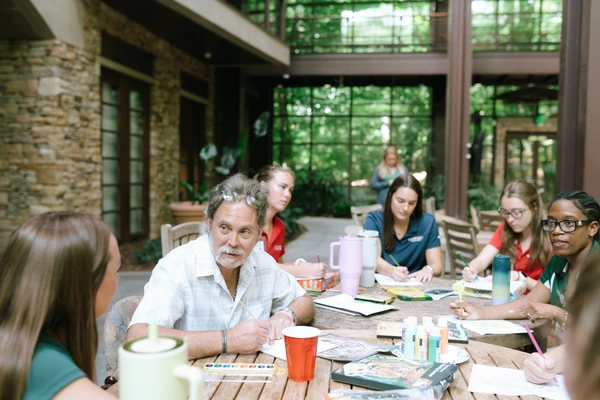
Since 2018, students in Samford University’s College of Health Sciences have brought classroom lessons to life through the Bright Ideas TBI Camp. A unique interprofessional experience for individuals with traumatic brain injuries and their caregivers, the camp offers renewed hope, practical tools and a healthy dose of fun.
A traumatic brain injury (TBI) occurs when a sudden trauma such as a fall, car accident or sports injury causes damage to the brain. Depending on the severity, a TBI can lead to a wide range of physical, emotional and cognitive challenges affecting everything from memory and mobility to mood and independence.
“This camp delivers targeted services to TBI survivors and their caregivers and gives students a unique chance to collaborate across disciplines while serving a population they may not typically encounter,” said Kelly Atkins, associate professor in Samford’s School of Health Professions’ physical therapy program.
Hosted in partnership with the Alabama Head Injury Foundation (AHIF), Bright Ideas TBI Camp brings together students from multiple disciplines. Samford participants include students in physical therapy, speech-language pathology and physician assistant studies, alongside occupational therapy students from the University of Alabama at Birmingham.
Bright Ideas TBI Camp is a space where survivors and their caregivers receive services tailored to their needs.
“Usually, candidates are several years out from their injuries and are not receiving therapy services at the time of camp,” said Atkins. “It takes a high level of collaboration and commitment from our programs and partners to make it happen and the impact is meaningful for everyone involved.”
This year, 19 TBI survivors and their caregivers participated, supported by 138 students. The camp gave students hands-on experience in interprofessional teamwork and a firsthand look at how health care disciplines collaborate and complement one another while serving the same patient.

“I focused on evaluating our patient’s balance and musculoskeletal system since both were areas of concern for her and her caregivers,” said Will Myer, a second-year physical therapy student.
Unlike a typical clinical rotation, students spend three consecutive days with the same patient, allowing for deeper rapport, continuity of care and a richer understanding of the TBI survivors’ long-term challenges.
“Spending three full days with a patient, getting to know their story, personality and health needs, is such a rare and valuable experience in health care,” Myer said.
The first day centered on conducting assessments and building rapport as students connected with their patients and started creating personalized care plans. On day two, interdisciplinary interventions took center stage, with participants engaging in activities like painting, basketball and weight training designed to advance therapeutic objectives. The final day included a range of interactive experiences such as video games, puzzles and exercises that fostered meaningful engagement for both patients and students.
“They become a family by day three,” said Scott Powell, executive director of AHIF. “It’s good for the students to experience how to bond so quickly with someone. It is something they carry with them throughout their career.”
Bright Ideas TBI Camp continues to be a powerful example of collaborative care in action and a reminder of how health care education can make a lasting difference one person at a time.
